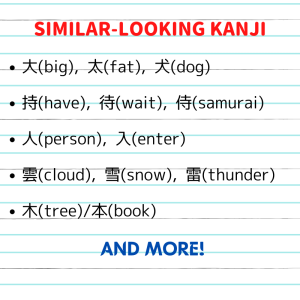This article provides a list of common Japanese words that have different meanings from what you may have already learnt in Japanese classes!
Table of Contents
うるさい
urusai
As you may know, うるさい in Japanese usually means “loud/noisy”. However, when it is used as “~にうるさい”, it means “be particular/picky/not easily satisfied about ~”. Its rationale is that if you harp on about your specific preferences about something, other people may find you a bit annoying and noisy (but it’s not a negative word at all!)
私はラーメンの味(あじ)にうるさい
I’m particular about the taste of ramen.
ヒモ
himo
ヒモ/ひも usually means “a string”, but also means “an indolent man who financially depends on his girlfriend excessively like a parasite and is reluctant to work by himself”, e.g. living in her house without paying the rent, or even asking her for an allowance to spend on gambling. This is a derogatory term for men who exploit and abuse their girlfriends financially, and therefore shouldn’t be used to describe those who stay home to manage their household and take care of their children instead of working outside.
私の彼氏を甘(あま)やかし過(す)ぎて、ヒモになってしまった。
I spoiled my boyfriend too much and he has become a ヒモ (a person who depends on me financially).
さくら
sakura
As you know, さくら (桜 in kanji) means “cherry blossom”. Oddly enough, however, when written in katakana (i.e. サクラ), it can also mean “a shill”: a person who pretends to be a real customer and promotes certain products or services. Note that サクラ can also mean “cherry blossom” depending on the context.
この口コミサイトにはサクラがたくさんいる
There are lots of shills on this review site
切れる
kireru
切れる is a basic Japanese intransitive verb that usually means “be cut” or “snap”, as in “ヒモが切れた” meaning “The string has been cut/has snapped”. However, it also means “run out” in a different context, as in “トイレットペーパーが切れているのに気がついた” meaning “I’ve just realised that the toilet paper has run out”. Furthermore, if it is used in the expression “~ が切れる” in which a noun denoting a date or period is put before が, it means “(something) passes the period”. For instance, “賞味期限(しょうみきげん)が切れた牛乳(ぎゅうにゅう)” means “The milk that has passed its best-before date.” and “チケットの有効期限(ゆうこうきげん)が切れた” means “The ticket has passed its valid date/has expired”. In a casual conversation, 切れる also means “get very angry/furious”, but in this case, it is more often written in hiragana and katakana, as in “キレる”, e.g. “彼はキレたら怖(こわ)い” means “He is very scary when he gets furious”.
See also
滑る
suberu
The Japanese word “滑(すべ)る” usually means “to slip”, as in “滑って転(ころ)んだ” meaning “(I) slipped and fell”. But it is also used to describe when someone tries to tell a joke but nobody finds it funny, introducing a quiet and awkward moment.
(e.g.)
彼女を笑(わら)わせようとしたら完全(かんぜん)にすべった
I tried to make her laugh but completely “slipped”.
* One of my friends once gave me a useful tip on how to deal with the situation when you’ve accidentally “slipped”: look at something far away, pretending that you are distracted by it and don’t notice that your joke completely failed!
Besides, 滑る also figuratively means “to fail school entrance exams”. Therefore, when it snows in Japan, students preparing for those kinds of exams (= 受験生) pay full attention to their steps to avoid slipping on ice.
なめる
nameru
なめる usually means ‘to lick”, as in “自分(じぶん)の指(ゆび)をなめる” (lick my fingers), but it also means “underestimate/mock/look down on something or someone”, as in “彼の力(ちから)をなめるなよ” meaning “Don’t underestimate his power”. Well, actually there isn’t a direct relation between these meanings, but it may help you memorise them if you picture a person who mocks someone by sticking his/her tongue out, like Albert Einstein’s iconic photo (albeit this is probably not what he intended.)
くさい
kusai
くさい usually means “smelly/stinky”, but it also means “(someone’s act is) cheesy/corny/too much”, which means, in other words, their act is, well, sh*tty (and thus “smelly”). Not only a clichéd act, it also describes a corny line that makes you cringe a bit, like “君を愛するために僕は生まれてきたんだ”, meaning “I was born to love you”.
Incidentally, “嘘(うそ)くさい” is another idiomatic expression that literally means “(something) smells like a lie” and actually means “fishy”.
くさい演技(えんぎ)はやめて、本当(ほんとう)のこと私(わたし)に言(い)って?
Please stop doing your “smelly” act, and tell me the truth?
「君(きみ)以外(いがい)何(なに)もいらない」?よくそんなくさいセリフ言えるね!
“I don’t need anything but you”? How dare you can say such a “smelly” line!
この本(ほん)に書(か)いていることはなんか嘘くさい
What is written in this book is a bit fishy.
嫌い
kirai
嫌い usually means “dislike”, as in りんごが嫌い means “I dislike an apple”. In a formal context, however, it is also used as a noun meaning “a bad tendency”, as in “彼(かれ)は話(はなし)を誇張(こちょう)するきらいがある” meaning “He has a bad tendency to exaggerate his stories”. In the latter case, the word is often written in hiragana to avoid confusion.
引く
hiku
引く (ひく, hiku) usually means “draw/pull”, as in “ロープを引く (pull a rope)”. However, it is also used as a slang term meaning “be put off by something/someone”, i.e. when you feel like drawing back because you find something/someone cringeworthy and off-putting. For instance, you would 引く (hiku) when someone says some disgusting sexual jokes.
Refer to the previous post for related words and pronunciation of 引く:
ブーメラン
būmeran
ブーメラン is a loanword from “boomerang” in English. However, as a slang term, it also refers to a hypocritical criticism that is thrown at others but also applies to the person who makes the criticism (i.e. a “look-who-is-talking” statement.). It’s called ‘boomerang’ because, after being thrown at others, it comes back to the criticiser like a boomerang.
More detailed explanations at:





Leave a Reply